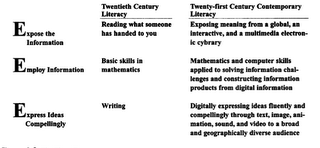
Web 2.0- Technology makes Literacy Sexy! Yes it's true!
(Graphic From Ricardson's "Redefining Literacy" click on the image to enlarge)
So you assign yet another written response for a reading assignment and your students do as they have done for all their teachers; they work independently and create a response that may or may not be very critical of the topic and submit this to the teacher, who must in the course of their teaching find time to respond to that students thinking. Once the assignment is returned, the conversation regarding the ideas has ended and the only people who have participated in the discussion are the teacher and student. Why not make the conversation public, invite criticism from fellow classmates, collaborate, include multimedia, or reference others thinking on the topic?
Consider an alternative: Will Richardson's article The New Face of Learning
explores the new literacy landscape. Basic literacy skills are still the foundation, yet the technology can definitely enhance the conversation. As Will mentions in his article, moving towards new forms of interaction does require some risk, but as Will puts it in his article, "How, as educators and learners, (will) we respond? Did we embrace the potentials of a connected, collaborative world and put our creative imaginations to work to reenvision our classrooms? Did we use these new tools to develop passionate, fearless, lifelong learners? Did we ourselves become those learners?
So what can you do with, an internet connection and a computer. Well, you don't have to reinvent the wheel. There are people who have been working at it. Today we'll look at two tools that are super accessible: Blogs and Wikis.
Blogs:- A blog is a website where entries are made in journal style and displayed in a reverse chronological order . Blogs often provide commentary or news on a particular subject, such as food, politics, or local news; some function as more personal online diaries. As you will see below, some are used to discuss class content such as novels, research, readings, experiments, etc.
Room 399 Blog- Linda Henry's blog challenges readers to make connections with their reading to the outside world.
AP Calculus A site published to help students learn calculus. Each day a student takes a turn as the note taker for the day and publishes at the end of the period.
Ratner's Hong Kong Travel Blog
Our cultural attache Mr. Ratner is doing his part to expose Hong Kong through western eyes. Having students report out as culture spies, investigators, reporters or biographers could be a powerful motivator.
There also blogs about education:
Kyle's ED Tech Blog-
Will Richardson's Blog
David Warlick's Blog
Wiki- is a type of Web site that allows the visitors themselves to easily add, remove, and otherwise edit and change some available content, sometimes without the need for registration.
Wikipedia - a collaborative online encyclopedia that started the wiki model.
Bigue's Understanding Film Wiki I use my film wiki as a place where my students review and present the information they are asked to process from their readings.
Rutigliano's Sophmore Wiki
Global Com
Kyle's Cisco Wiki
So, you want to give it a shot? There are a few pitfalls we've encountered, so make sure be upfront about your expectations before you cut them loose.
1. Avoid Anonymity- create user accounts that identify the student, period number and in some cases the teacher. (Example: justinmdwyer 5)- blog directions
2. Model Academic Writing- No IM (Instant Messaging) Speak!
3. Verify and quote your sources. Read Online Alert: Be a Skeptic!
4. Embed links in your thinking. Reading and writing can be 3D when you link your ideas or vocabulary to other resources as you write.
5. Model ethical use of materials.
6. Build in some sort of accountability for responses by having students copy and paste posts and responses.
Try these FREE Tools
Schoolloop- Yes even schoollop will allow your students to reply to homework assignments and hold discussions.
Blogger.com
Blogmeister
Wetpaint.com
Wikispaces
Before you leave today, let me know your thoughts and ideas on some of what we talked about today.
Thanks
No comments:
Post a Comment